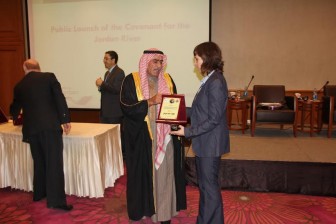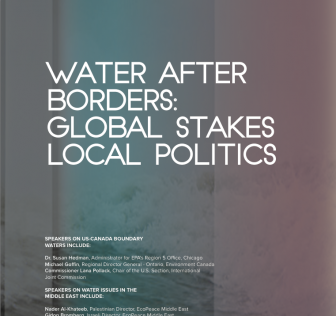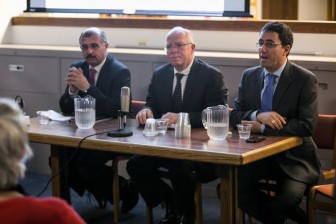
Rachel Havrelock, a professor at the University of Illinois at Chicago, is acknowledged by the Jordanian minister of tourism for her water management efforts in the Jordan Valley. Image: Rachel Havrelock
By Holly Drankhan
The Great Lakes region and the Jordan Valley in the Middle East appear to have little in common.
The Great Lakes contain one fifth of the Earth’s surface fresh water and are governed by peaceful diplomacy. The Jordan Valley is gripped by drought and experiences frequent conflict.
However, when it comes to the policy, activism and distribution of water, each region has much to learn from the other, said Rachel Havrelock, associate professor of Jewish studies and English at the University of Illinois at Chicago.
That is why Havrelock organized a free two-day summit called Water After Borders: Global Stakes, Local Politics Thursday and Friday at the University of Illinois at Chicago. The agenda and registration details are here.

The conference is Thursday and Friday in Chicago
Participants include professors, students, researchers, government representatives and activists from the United States, Canada and the Middle East. Pollution and privatization of the Great Lakes and cross-border environmental activism in the Jordan Valley are among the issues up for discussion.
“Between the changing water geography and the changing resource economy, we just have to get more people on the local level in on that conversation and also more people thinking through new ideas for these new realities,” Havrelock said.
Attendees will discuss topics as diverse as faith-based conservation, stormwater management and sustainability efforts at Chicago’s Shedd Aquarium. They will brainstorm new policies and how to implement them.
The summit also launches the new Freshwater Lab for Water Policy and Diplomacy, a partnership between the University of Illinois at Chicago, the University of Michigan and Michigan State University. The lab will investigate water issues from the perspective of the humanities rather than the conventional fields of science or engineering, said Havrelock, the lab’s lead investigator.

Water After Borders panelists include the three directors of EcoPeace Middle East, from left, Palestinian Director Nader Al-Khateeb, Jordanian Director Munqeth Mehyar and Israeli Director Gidon Bromberg. Image: Linda Vivra
“It is really thinking about water not as being this element that is around or flows in and flows out of society but as something that is embedded in our social structures,” said project partner Stephen Gasteyer, an assistant professor of sociology at Michigan State University. “Thinking about water in that way makes you have to think about the very social issues of power and dynamics and institutions and histories in a way that is much more interactive.”
The three universities will design courses to be taught at their institutions, incorporating topics from the summit. At Michigan State University, these courses will include field trips and guest speakers to inform students about issues like water infrastructure in Detroit and water rights in Native American communities, said Gasteyer. At the University of Illinois at Chicago, students will develop public awareness campaigns, videos, art shows and policy papers to address various environmental justice issues, said Havrelock.
“I think ultimately water is one of these things that we will always have to deal with,” Gasteyer said. “This is an issue that will be with us forever, and a lot of the solutions are going to take a long time to manifest. And so you need to be training that next generation to be thinking about these resources in dynamic ways.”
As the first day of the summit concludes, attendees can visit the studio of Chicago artist Doug Fogelson to view the Water in Art exhibition. The collection, featured in an online gallery, includes photographs, sculptures, videos and even bottled algae from the Chicago metropolitan area.
One artist took portraits of individuals he found along Lake Michigan’s shoreline. Another collected fabric pieces dipped in rivers across the world. A third photographed the River Rouge coal plant near Detroit, which is a source of both employment and pollution.
“I think [the collection] will only help to make the conversations richer,” said Fogelson, the gallery’s curator. “It is one thing to sit around and talk about policy or to legislate things or to do things like that, but it is another to transfer the conversation from that to abstract art. I think only good things can come from that.”
The summit features panels of Great Lakes international, national, state, county and city legislators discussing how each contributes to effective and flexible water policy
Another panel includes representatives from EcoPeace Middle East, a grassroots organization of people from Israel, Jordan and Palestine. Its Good Water Neighbors program unites government representatives, environmental activists and young people to encourage cross-border management of shared water resources.
The program’s successes include replenishing diverted regions of the Jordan River with water from the Sea of Galilee for the first time in 50 years, said Gidon Bromberg, Israeli director for EcoPeace Middle East.
“Appealing to the self-interest of each side — that is, emphasizing the mutual benefits gained from cross-border cooperation over water — the program generates political will for such cooperative relations, and empowers local stakeholders to lead in this direction and pressure the national leaderships to do so on the government level,” Bromberg said.
The Great Lakes region can learn from the community activism inspired by the Good Water Neighbors program in situations of water scarcity and persistent conflict, Havrelock said.
“With all the looming questions about water use and management, I think that we also have a few notes to take from them about empowering communities and enfranchising greater numbers of people in questions of water management,” Havrelock said.
Mayors from Palestine, Jordan, Wisconsin, Quebec, Ontario and a representative of Israel will sign a treaty to create a Sister Waters partnership, agreeing to “facilitate technological, business, educational, capacity-building and community exchanges.”
Whether the conference will come up with absolute answers is unknown, Gasteyer said. “But if we put in place the relationships, those can then create dialogues that can possibly open opportunities for learning.”